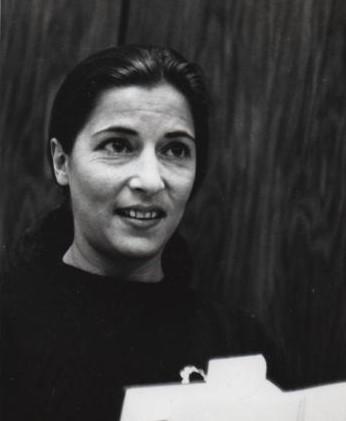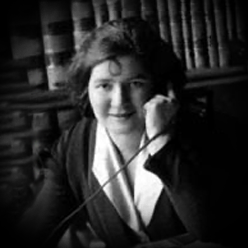Since its inception in 1908, many of the women who have walked through the halls of Rutgers Law School have gone on to make history. In the ensuing years, it has been home to former U.S. Supreme Court Justice Ruth Bader Ginsburg, U.S. Senator Elizabeth Warren, and Fabiana Pierre-Louis, the first African-American woman to serve on the New Jersey Supreme Court. Rutgers Law School is proud to continue its tradition of supporting women in their pursuit of excellence as lawyers, faculty, and administrators.

Perhaps Rutgers Law School's most well-known woman professor is former U.S. Supreme Court Justice Ruth Bader Ginsburg, who taught at Rutgers Law School from 1963-1972.
In his remembrance of her after her death in 2020, Rutgers Law School Co-Dean David Lopez said, " During her tenure at Rutgers, she was a highly popular professor and was the inaugural advisor to the Women’s Rights Law Reporter, the first law journal in the United States focused on issues of gender equality and justice. This journal was established by law students during the early days of our “People’s Electric Law School.” Elizabeth Langer, the first editor-in-chief of the Reporter, remembered then-Professor Ginsburg as a “taskmaster.” Still, she recalls,
She gave us credibility. Gave us legitimacy. Defended us to faculty members who thought this was ridiculous. And she shepherded us through, along with a lot of enthusiastic law students. Mostly women.

Fabiana Pierre-Louis RLAW '06 became the first Black female justice on the New Jersey Supreme Court in September 2020.
Nominated by N.J. Gov. Phil Murphy for a seat on the state Supreme Court, Pierre-Louis, the daughter of Haitian immigrants, also has worked as a prosecutor in the U.S. Attorney’s Office and as a defense lawyer with a private law firm. Pierre-Louis was a superlative law student who graduated magna cum laude from Rutgers Law School in Camden.
During her nine years at the U.S. Attorney’s Office in New Jersey, she rose to the position of attorney-in-charge at the Trenton branch office and, later, attorney-in-charge at the Camden branch office. In both cases, she was the first Black woman to have that role. When she returned to private practice, she did so as a partner at the firm of Montgomery McCracken.
“I can think of few people who are more qualified to sit on the highest court of our state,” said Rutgers Law Co-Dean Kimberly Mutcherson. “Fabiana is incredibly smart and a superb lawyer. Equally as important, she is thoughtful, compassionate, committed to the rule of law, and to a fair and unbiased system of justice. Having known Fabiana for many years, I’ve no doubt that the people of this state would be well served by a justice who brings her skill set and background to the New Jersey Supreme Court.”

Elizabeth Warren RLAW '76 was the first woman elected to the U.S. Senate from the state of Massachusetts and was also a candidate for president in 2020.
“Rutgers Law opened a thousand doors for me," Warren said in a statement to The Philadelphia Inquirer in 2019. “I learned important thinking skills. I got a law degree. But most of all, Rutgers put me to the test to figure out who I was and what I could do."
She serves on the Committee on Banking, Housing, and Urban Affairs; the Committee on Health, Education, Labor and Pensions; the Special Committee on Aging; and the Armed Services Committee and taught at the University of Pennsylvania.
She sat down for an interview at Rutgers in 2011 and welcomed Douglass Residential College's incoming class during last fall's convocation.

Elizabeth Blume Silverstein was a member of the first full-term graduating class of Rutgers Law School in Newark, graduating in 1911.
According to the Rutgers Alumni Association:
Despite her teacher’s disapproval, Elizabeth Blume-Silverstein decided on a law career in eighth grade. “I resolved to become a lawyer even if some people think the profession unfit for a girl,” she said. In 1911, she was in the first full-term graduating class of Rutgers’ School of Law–Newark. She was a woman of many “firsts” in areas dominated by men, including trying and winning a murder case, being elected to the American Jewish Congress in 1916, and serving on the Essex County Draft Board as a legal adviser during World War I. She was only 18 when she graduated from the law school, which was three years too young to take the bar exam in those days. Soon after her 21st birthday, she became one of the first women in the state to pass the bar. By the time she was 29, she ran one of the most active law practices in Newark. She worked as a member of the Women’s Political Union—the state’s suffrage organization—to pass the 19th Amendment. In 1932, she helped draft the Republican Party platform urging the repeal of Prohibition. Because of the way the law was written at the time of her 1934 marriage to Max Silverstein, she was one of the first women to hyphenate her name to protect the legality of the work she had done while single. She died in 1991.